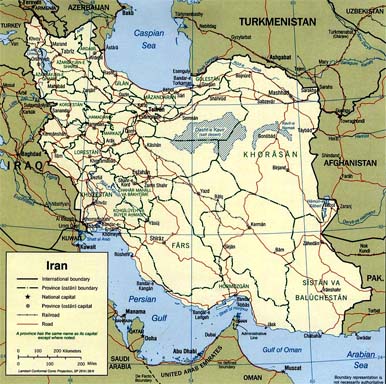Rami G. Khouri, The Daily Star, February 3rd, 2007

Regardless of whether the United States’ current military surge and slight shift in tactics in Iraq succeeds or not, Washington has clearly defined and started to implement its fallback plan in the Middle East: an across-the-board battle against Iran. The US has unleashed, or unsheathed, military, diplomatic, economic, proxy, clandestine, and rhetorical means to hold the line against Tehran’s growing regional power.
This is what is called a “full court press” in basketball strategy, where you aggressively harass and push against the opponent at all points on the court, hoping to slow down his momentum and fluster him into making mistakes. As a fan, I have experienced the thrill of a full court press, but also recognize it as a desperate tactic, used when all else fails, and enjoying very mixed chances of success.
This is an understandable strategy on Washington’s part, given its recent history of panic, mistakes, and Israel-driven policy. Yet actively confronting Iran and its allies is another reckless throw of the dice, engineered by fading neoconservatives in Washington. They have transformed the Middle East from an arena of traditional big-power confrontations to an ideological casino where a single superpower rolls the dice every few years – testing out half-baked new theories based on wild assumptions, a largely failed track record, and highly unpredictable odds. America’s neocon romantics were trouble enough for the Middle East; desperate gamblers with their backs to the wall and wagering on our future wellbeing are infinitely worse, and much more insulting.
Iran’s growing influence throughout the Middle East is due to several historical factors, most but not all of which are beyond the control of Washington. They include the end of the Cold War, Iran’s size, resources and activist ideology, the overthrow of the Baathist regime in Iraq and the rise to power there of Iran-friendly Iraqi Shiite groups. They also include the collective diplomatic incoherence of the Arab world, over 5,000 years of steady growth of Iranian nationalism, identity and state power, and the continuing self-assertion of Arab Shiites throughout the region who tend to have good relations with fellow Shiites in Iran. Sounds to me like a natural regional power that one should coexist with on the basis of shared rules, rather than mutual threats.
Washington’s designation of Iran as a troublemaker and a danger to the US, Israel and the Arab states is couched in a usual combination of vague threats, dismissive assumptions, unproven accusations, and cartoon-like bad-guy denigration. The charges against Iran disturbingly mirror those in 2002-2003 against Saddam Hussein’s Iraq. One hopes that the Democrats, the Congress as a whole, and especially the American media and religious institutions, will not roll over and play dead this time around. Instead, they should demand from the Bush administration credible evidence against Iran, especially if military action is planned.
Solid, proven evidence would trigger legitimate responses against Iran, and much of the world would probably join in – but only if real proof were presented, rather than Bush’s ideological babble anchored in an Israeli penchant for attack and America’s post-9/11 anger and confusion. We don’t need more of these ugly policy drivers that sent the US into a criminal, destructive mess in Iraq, and helped push the Middle East toward its current state of national fragmentation, political polarization, power contestation, and social explosion.
The US should be awarded a Cosmic Prize for Chutzpah and Chicanery for charging Iran with meddling in Iraq and threatening American lives. The reason is that the accusation makes little sense when the US invaded Iraq, removed the former state structure, killed tens of thousands of people, unleashed ethnic-religious discord there, and allowed Iran to emerge as the dominant regional power. What does the Bush administration take us for, simpletons and idiots? Are the people of the Middle East supposed to applaud American military aggression, diplomatic adventurism, and national experiments with Arab societies? No wonder that huge majorities of Middle Easterners criticize US policies and feel threatened by them.
If we were asked to support an assault against Iran mainly in order to comply with American and Israeli hysteria, the likely response from most quarters in the Arab world, Iran, Turkey, and others nearby would be to resist and defy the US and Israel, and fight them politically or militarily. This is the stage we are at now, as much of public opinion in the region rejects the American-Israeli position, while many Arab governments seek protection under Washington’s wing.
This is a recipe for continued violence and instability throughout the region. We should not play stupid and act surprised by the further collapse of regimes, states and societies in the years ahead. This will occur if current trends persist, in the context of an overarching US-Iranian face-off that includes battles among local proxies, as we are now witnessing in Lebanon and Palestine.
Rami G. Khouri writes a regular commentary for THE DAILY STAR.


